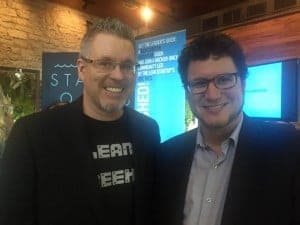I've been intrigued by the “Lean Startup” movement since I first saw Eric Ries speak at MIT back in late 2009. I've read his book The Lean Startup, have attended a bunch of the conferences (speaking at two of them – see video of one). I've interviewed Eric on my podcast series (listen here and here).
There's a lot to learn and apply in life and at KaiNexus. I'm by no means an expert in Lean Startup approaches… but at the core, Lean is Lean. Eric gives credit to Taiichi Ohno in his book (and listen to us discuss that here).
I'm excited to have been named a “faculty member” to help plan this year's Lean Startup Conference, to be held in San Francisco this November. My role is to help identify and recruit speakers to talk about “traditional Lean” — the universal Lean philosophies and management practices that apply in factories, healthcare, startups, etc. Sort of like what John Shook talked about last year. So, I hope to see you there!
Free Webcast
I'm also going to be moderating a free webcast today: “Speed as a Competitive Advantage.”
Here is the recording:
The speakers are Eric, along with Mark Little, the head of GE Global Research, as they discuss GE FastWorks, an initiative at one of the world's largest companies inspired by the Lean Startup method.
I hope you can join us today. Or, it will be recorded and posted on YouTube (I'll update this post with the video).
Listen to Mark read this post (subscribe to the podcast):
The Family Tree of Lean
Lean started with “Lean Production” over 25 years ago, as a different name or adaptation of the Toyota Production System. Lean became the “Lean Enterprise” or “Lean Thinking” as practices and management methods spread to all parts of the manufacturing companies and to industries outside of automotive.
For the past 13 years or so, we've had “Lean Healthcare,” which I've been participating in for ten years now. Lean Healthcare is more like the adaptation of Lean Enterprise… focused on improving existing operations, managing different, improving quality and flow, etc.
With the term and methodology being developed later than that, the “Lean Startup” is an approach that has been adapted to startups who are creating new products and services. The approach is being used by big companies like GE and Toyota, as they find new ways to develop innovative new products that will win in the marketplace.
See videos of Toyota and GE at past conferences:
Toyota
General Electric
Toyota, for example, uses Lean Manufacturing (they'd call it the Toyota Production System) and they have a Lean Management approach (also TPS along with the Toyota Way management system). Toyota manages existing operations with Lean Manufacturing (let's just call it Lean). They can also use Lean Startup to develop new products and services. Same with GE – Lean Manufacturing and Lean Startup can co-exist.
Here is the GE “FastWorks” methodology:
It sort of looks like a Kaizen cycle or a PDSA cycle. In one of the articles I'm reading to prep, there was this funny quote from Mark Little about Eric Ries:
“We're looking at young Eric and thinking how the hell is this software dude going to have anything to say to us,” Little said. “And yet his ideas were transformational for us. I went in completely skeptical about it. I came away completely enthused.”
Eric was skeptical too, as I captured in my notes from the 2013 conference:
“Nobody was more skeptical than I was when this started… due to my image of what working in a big company would be like.”
I've had doctors and hospital leaders think, “How the hell is this manufacturing dude doing to have anything to say to us?” But, the ideas and concepts from Lean can and do make a difference.
Does “Lean Startup” Apply in Healthcare?
In healthcare, “Lean Healthcare” is also generally about the improvement and the management of existing healthcare organizations and healthcare delivery. When people hear about what I do, if they're a Lean Startup person, they'll often ask “Ah, so they do Lean Startups in healthcare now?”
No, that's not what I do.
A health system COULD use Lean Startup methods to develop a new service line, perhaps. I'm not aware of anybody doing that (please post a comment if you do). My short talk at the 2012 conference was about the parallels between “Lean Design” (for the design and construction of new hospital space) and Lean Startup.
I'm excited to continue learning from Eric and from companies like GE. It helps me be a better Lean thinker even if I'm not launching a brand new startup myself… it helps as we try to grow KaiNexus. Our CEO Greg Jacobson, MD said the other day: “We were a Lean Startup before Lean Startup was a thing.”
What do you think? Please scroll down (or click) to post a comment. Or please share the post with your thoughts on LinkedIn – and follow me or connect with me there.
Did you like this post? Make sure you don't miss a post or podcast — Subscribe to get notified about posts via email daily or weekly.
Check out my latest book, The Mistakes That Make Us: Cultivating a Culture of Learning and Innovation:










[…] I Moderated a #LeanStartup Webcast Today: “Speed as a … https://www.leanblog.org/Mark Graban & Eric Ries, in Austin 2015 I've been intrigued by the "Lean Startup" movement since I first saw Eric Ries speak at MIT back in late 2009. […]